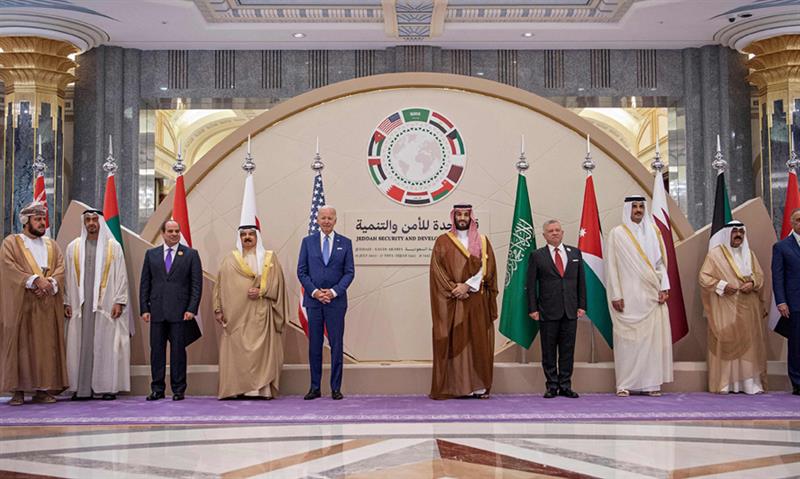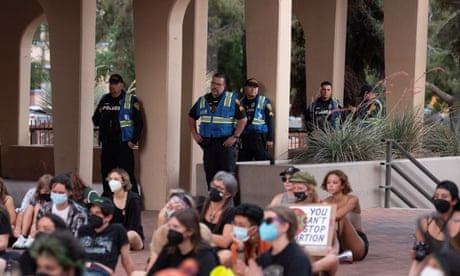
Biden Failed In The Middle East On Three Counts – OpEd
By Marwan Asmar
Biden went back to Washington from his Middle East trip empty handed. He never got out of the tour what he set out to do. The Arab leaders meeting in Jeddah under the GCC banner plus Jordan, Iraq and Egypt give him an effective snub and a thumbs down.
Aside from increasing America’s chummy relations with Israel, which was expected, the US President and his White House team failed on at least three counts. On the issue of increasing oil production to lower prices, Biden only got vague promises from his hosts, King Salman and his Crown Prince Mohammad Bin Salman. He didn’t receive real assurances and commitments that there would be hikes because of the OPEC plus meeting that sets production quotas for each member country and that is not due to meet till early August.
In reality however the Gulf states are happy with the current hikes in oil prices because they mean more revenues for countries like Saudi Arabia and the United Arab Emirates who are fighting a war in Yemen despite the present truce there but it is difficult to see how much that would last. This failure to provide a guaranteed commitment to hike up productivity and some say stabilize prices is seen as a blow to Biden who faces congressional elections in November and high oil prices are not favorable to the American consumer.
On second count he failed to convince the Saudis to normalize relations with Israel, despite the tinkering, here and there, of open airspace for all international aircraft carriers. There was much media talk prior to the trip that there is a strong possibility Riyadh would normalize with Israel. Analysts had said the Israelis pushed him to go to Saudi Arabia for this purpose. But this flopped. The topic was not even brought up at the Jeddah Security and Development Summit.
If anything it was argued the meeting proved to be decidedly anti-Israeli despite the normalization states of Bahrain and the United Arab Emirates. Every Arab leader in the summit stuck to their principled Palestinian stance regarding independent statehood and the two-state solution, a concept that Biden and the American administration say they accept despite the fact that he already told the Palestinians in Bethlehem when he met President Mahmood Abbas that the time is not ripe to kick-start the Israeli-Palestinian negotiating process.
On the third count Biden failed to whip an anti-Iranian stance for the Gulf countries want a reproachment with Tehran and believe that a conciliatory approach would be better than abrasive outlook with a possibility of a direct strike on Iran which is what Israel wants. That includes the Saudis, who are talking to the Iranians in Baghdad, the UAE, Kuwaitis, Qataris, the Iraqis who want to engage Iran in a constructive dialogue.
Israeli had hoped that Biden would convince the Arab countries to establish a NATO-like military alliance in the Arab world to stand up to Iran and its military and nuclear capabilities. But this has failed and the Saudis in a point-blank fashion said they are not interested in such an alliance that would necessarily include Israel although they told they American president that they want to make sure that Iran would never be able to possess the nuclear bomb or any weapon of mass destruction.
Iranians officials on the other hand accused Biden of spreading what they termed as “Iranophobia” and trying to stir the region against the leadership in Tehran. But the White House might be playing some kind of a chess game or what people might be called brinkmanship and sending out signals to the Iranians to accept a new nuclear deal, similar to the 2015 deal, which the US left in 2018 but wants to re-enter under new conditions and new strings attached.
The Iranians are playing hardball despite their continuous meetings in Vienna starting last October and which were interrupted by Russia’s war on Ukraine, and their stop-go meetings in Qatar under European auspices. Tehran wants a deal with benefits and Washington wants a deal because it believes this would be the best way to check Iran’s nuclear ambitions through a rigorous inspection regime.
But its as if yet, there is procrastinations on both sides to the delight of Israelis. As well, Biden, a long-time seasoned politician with much experience in the ins and outs of international diplomacy, might be tangling himself up because of his foreign policy options because of the Russian war in the Ukraine and China.
But when he left Saudi Arabia, he said he is determined this time, not to leave the Middle East to Moscow and Beijing and that Washington wants to re-enter this vital and dynamic regional arena. He signed a strategic accord with the Saudis despite the Jamal Khashoggi murder case, he wants to explore more diplomatic options regarding Iran’s nuclear program – and hence the Doha talks – and has even invited the UAE president Mohammad Ben Zayed to the White House to rectify the previously cold relations between Washington and Abu Dhabi.
Thus, it may seem he left the region empty handed Biden is determined to revitalize relations with different actors in the Middle East.
US President Joe Biden and Saudi Arabia's King Salman meeting at Al-Salam Palace in Jeddah. (SPA)
Original article
Al Bawaba News
Al Bawaba provides top stories and breaking news about the Middle East and the world. The Al Bawaba network consists of several web portals and media platforms.
Biden ineffective in the Gulf
Ahmed Mustafa, Tuesday 19 Jul 2022
US President Joe Biden tried to mend relations with a “unified” Gulf and Arab world but the results are not up to expectations, reports Ahmed Mustafa
Just one day after US President Joe Biden ended his visit to Saudi Arabia, one of the main goals of his first Middle East trip as a president was tested. The result indicated that it might take a while for the agreements concluded in the visit to have a visible impact on the ground.
As markets opened for business in Asia after the weekend on Monday, oil prices reached the hundred-dollar-per-barrel threshold they had just missed last week. Oil markets did not reflect the supposed Saudi promise to Biden to increase oil production to lower prices. They kept going up as fears of supply chokes persisted.
The US administration repeatedly denied that Biden’s visit to Jeddah was about oil. But once he flew direct from Israel to Saudi Arabia, marking the Saudi opening of their airspace to flights from Israel, oil was not only in the news but in the president’s remarks and in Saudi officials’ statements.
After meeting Saudi Crown Prince Mohamed bin Salman on Friday, Biden felt he “had secured Saudi Arabia’s agreement to produce more oil in the coming weeks”, as the president told reporters. The Crown Prince then announced that his country will increase its oil production to 13 million barrels per day to satisfy demand if needed and balance the market.
Contradictory statements from the Americans and Saudis about Biden raising the issue of the Khashoggi murder, oil and other issues marked the first part of Biden’s visit to Saudi Arabia. The second part of the visit was meeting Gulf and three other Arab leaders in a Development and Security summit the Saudis hosted in Jeddah.
Though Biden said his message to Gulf and Arab leaders was “We will not walk away (from the region) and leave a vacuum to be filled by China, Russia, or Iran”, none of the leaders present in Jeddah reiterated that message. So, the whole trip was just a reset of America’s relations with the Middle East, strained since Biden came to the White House early last year. Saudi commentator Abdel-Aziz Alkhames told Al-Ahram Weekly, “It was inevitable for Biden to visit, mainly to repair the damage he caused to relations. It would re-establish better cooperation between the US and the region”.
From a Western perspective it was mainly a win for Saudi crown prince and UAE President Mohamed bin Zayed. Oxford University historian Andrew Hammond said of the visit: “Just the sight of decrepit Biden having to go begging in KSA [Kingdom of Saudi Arabia] to make up with them was pathetic. Saudis and Emiratis were in a very strong position. They got what they wanted more than ever.”
But a very significant byproduct of Biden’s visit was the apparent realignment of Saudi-Emirati relations. Rumours recently spoke of a slight rift between Riyadh and Abu Dhabi on regional issues, ranging from Iran and Yemen to normalisation with Israel. But the Jeddah summit with Biden showed a unified position of the two countries – at least apparently.
The summit was preceded by only three one-on-one meetings with the leaders of Egypt, Iraq and UAE. The one who won an invitation to visit the White House was the UAE president. In fact, just a day before Biden arrived, the UAE signed a cooperation agreement with Iran that might not be significant in a practical sense but does send a message. Official Emirati statements reiterated the position that the UAE is ready to compromise with Iran for the sake of peace and stability in the region without the help of a third party.
Yet, as Alkhames strongly suggested, “Saudi-Emirati coordination has been crystal clear, as it was in the past as well. You notice that the UAE didn’t ask for the floor to deliver its own speech at the summit. That is because they assumed that the Saudi statement spoke for them, communicating the same stance.” He also added, on one of Biden’s goals, “I don’t think the attempt to push the region, especially Saudi Arabia and the UAE, away from China and Russia was successful. Relations with these powers are already established based on mutual interests with the two important countries. A lesson is learnt from past mistakes, and the countries in the region are going to deal with Washington differently, putting their national interest first with no ‘free lunch’ for the US or anyone else.”
The Emirati stance on raising oil production to help Biden internally, with his administration facing public anger over fuel price increases, has been harder than the Saudi, especially that according to oil experts the UAE is already quite close to the maximum possible daily production. But Alkhames said, “as for oil, there might be an increase in production but definitely based on market conditions. Everybody is hurt by inflation, consumers and producers alike. So increasing production will be subject to the ultimate goal of balancing the markets and thus ensuring fair oil prices.”
It appeared that promises and diplomatic rhetoric were the main outcome, and with the Saudi crown prince now getting a sort of “American exoneration” – as one Western diplomat described it – the region is back to good relations with Washington but on a different footing. “It seemed like a visit aimed at making up with allies showing more independence from the United States than before, as the Ukraine war has shown. Biden framed it as an attempt to reassure regional allies of a continued US commitment to the region but also to bring Israel even closer to his Arab allies and push them towards joint defence arrangements, aimed against Iran. So he gave the impression of pushing the region towards confrontation at a time when tensions are actually quite a bit lower than during the Trump years, as Washington is trying to revive the nuclear deal with Tehran. We can only assume this is another one of those hawkish moves often made to offset a dove-like one, i.e. finalising a deal with Iran that would see sanctions lifted and limits on Iran’s nuclear programme.”
Regardless of public statements and any possible backstage deals, pressing the reset button on Gulf relations does not guarantee a proper startup. One might need to switch off and on multiple times before returning to normal operation. But the current regional and global environment does not provide an ideal situation for more attempts, so the status quo persists for now.
*A version of this article appears in print in the 21 July, 2022 edition of Al-Ahram Weekly.
One summit, different versions
Salah Nasrawi , Tuesday 19 Jul 2022
A trip to the region has tested Joe Biden’s new Middle East policy, but has the US president notched up a political victory just by sharing the spotlight with nine Arab leaders? Probably not, writes Salah Nasrawi

The aim, US President Joe Biden said, before setting off on a Middle East tour that ended in a summit with his Arab counterparts on 16 July in Saudi Arabia was to start a new and more promising chapter of America’s engagement there.
In an opinion article in the Washington Post titled “Why I’m going to Saudi Arabia” on the eve of his four-day tour, Biden laid out the selling points of his ambitious diplomacy by emphasising that the tour “comes at a vital time for the region, and it will advance important American interests.”
Outlining some of the critical disputes in the Middle East, Biden sought to defend his administration’s policies and pledged to build on “promising trends” that he boasted “the United States can strengthen in a way no other country can.”
On the stalled indirect talks with Iran over its nuclear programme, Biden wrote that he “will continue to increase diplomatic and economic pressure until Iran is ready to return to compliance with the 2015 nuclear deal,” known as the Joint Comprehensive Plan of Action (JCPOA).
On Saudi Arabia, where his administration’s relations have been strained over the killing of Saudi journalist Jamal Khashoggi, Biden said his aim was to “reorient – but not rupture – relations with a country that’s been a strategic partner for 80 years.”
Biden stressed Saudi Arabia’s role in helping to support the truce in Yemen and pressing for additional oil production as part of efforts to help stabilise oil markets with other OPEC producers, two issues which he hoped would help to reinforce US-Saudi ties.
Biden’s account of his trip also focused on his efforts to promote US security interests in the Middle East by countering Russia’s and China’s increasing influence in the region, which he attributed to the “mistake” of “walking away from our influence.”
The other key issue on Biden’s agenda was to push for Riyadh’s diplomatic normalisation with Tel Aviv in order to “help build momentum towards Israel’s further integration into the region.”
The normalisation of relations between Saudi Arabia and Israel would be the most significant expansion of the so-called “Abraham Accords” associated with former US president Donald Trump.
Yet, some major disagreements surfaced during the three stops on his controversial tour, which Biden decided it was worth the political cost of carrying out in order to counter dwindling US influence in the Middle East despite mounting opposition and scepticism.
In Israel, Biden diverged from Israeli Prime Minister Yair Lapid on Iran. While Biden said he still wanted to give diplomacy a chance to persuade Tehran to join a new nuclear deal, Lapid insisted that words alone would not thwart the Islamic Republic’s nuclear ambitions.
“Words will not stop them, Mr President. Diplomacy will not stop them,” Lapid said. “The only thing that will stop Iran is knowing that if they continue to develop their nuclear programme, the free world will use force,” he said at a joint press conference.
During his visit to the Palestinian Territories, Biden reaffirmed his support for a two-state solution to the decades-long Israeli-Palestinian conflict after meeting with Palestinian President Mahmoud Abbas in the Occupied West Bank. However, he claimed that the “ground is not ripe” for restarting the talks between Israel and Palestine.
Abbas, who has been trying to convince successive US administrations to take a more active role in stalled Middle East peace efforts, warned that there was a narrowing window for the two-state solution to resolve the Israeli-Palestinian conflict.
In a final communiqué issued following their summit with Biden on 16 July, Arab leaders reiterated that any settlement to the Palestinian-Israeli conflict should be based on the two-state solution and take into consideration the 2001 Arab Peace Plan that trades normalisation for the return of the occupied territories.
In Saudi Arabia, the trickiest diplomatic terrain Biden encountered on his Middle East trip, Biden had to bounce back on his earlier promise to make the kingdom into a “pariah” nation and was compelled to do business with Saudi Crown Prince Mohamed bin Salman, whom the US intelligence community had earlier concluded had sanctioned Khashoggi’s murder.
In exchange, Biden may have been able to secure a half-hearted Saudi commitment to raising oil production, badly needed to balance the international market and ease high petrol prices and widespread inflation in the US and across the globe.
However, Bin Salman’s announcement that Saudi Arabia would increase oil production to 13 million barrels per day pending the outcome of a meeting of the OPEC+ group of countries on 3 August did not have an immediate effect on the market, probably because of expert doubts that the kingdom has much more oil-production capacity to deliver.
If Saudi Arabia does not increase its production, high oil prices will continue to pose a political threat to Biden and other leaders who are hoping to quell an oil-market rally that threatens global economic growth and is hindering efforts to choke off Russian oil revenues in retaliation for its invasion of Ukraine.
Further setbacks appeared when Biden met with Arab leaders in Jeddah for their summit meeting on Saturday, where he sought to integrate Israel into the region as part of a new axis aimed at encouraging more Arab countries to normalise their relations with Israel, seen as the crown jewel of Biden’s landmark trip.
Riyadh has taken a small step in allowing Israeli planes to fly over its airspace, but all eyes have nevertheless remained on Saudi Arabia with a view to seeing whether it will take steps to improve its ties with Israel including by establishing full diplomatic relations with Tel Aviv.
Saudi Minister of State for Foreign Affairs Adel Al-Jubeir told the US network CNN that the kingdom would not fully normalise its ties with Israel until an independent Palestinian state with East Jerusalem as its capital was established.
Saudi Foreign Minister Faisal bin Farhan Al Saud also shrugged off reports about “any discussions regarding a GCC [Gulf Cooperation Council]-Israeli defence alliance in the integrated air defence network the United States is hoping to establish with Mideast allies.”
There were also further divergences of opinion, underscoring the multiple versions of a summit that Biden had hoped in his Washington Post piece would produce “promising trends which the United States can strengthen in a way no other country can.”
Egyptian President Abdel-Fattah Al-Sisi emphasised two themes that have always been dear to Egyptian policymakers: Arab national security and a Middle East free of nuclear weapons.
Calling for the mobilisation of Arab potential to confront the “dangers surrounding our Arab world,” Al-Sisi renewed Egypt’s demand that the region be declared a nuclear-free zone under International Atomic Energy Agency (IAEA) supervision, a demand opposed by Israel and stalled by the US.
The UAE showed a clear reluctance to support regional escalation against Iran. On the eve of the Jeddah summit, UAE Presidential Diplomatic Adviser Anwar Gargash said the idea of a confrontational approach to Iran was not something Abu Dhabi supported.
Stressing that his country would not be part of an anti-Iran axis, Gargash told reporters that “our conversation is ongoing... we are in the process of sending an ambassador to Tehran. All these areas of rebuilding bridges are ongoing.”
Iraqi Prime Minister Mustafa Al-Kadhimi, whose country’s parliament has just made it illegal to normalise relations with Israel and where Iran enjoys unprecedented influence, made it clear that he wanted the summit to focus on energy, food security, environmental challenges and cooperation on infrastructure and trade.
Biden and his foreign policy and national security teams may believe that the US still has plenty of influence in the region, enabling it to contain creeping Russian and Chinese power in the Middle East.
But in order to “build on this moment with active, principled American leadership” and return to a region Biden has long abandoned and sit with leaders whom he has abhorred as autocrats could require much careful follow-up.
Whether Bidden has left his mark on the Middle East by rekindling regional alliances and reestablishing US supremacy, and whether his trip will succeed in curbing petrol prices back home before crucial mid-term elections, remains to be seen.
To many sceptics in the region, Biden may simply have returned to Washington with “Hunain’s slippers” – a classical Arabic proverb about a Bedouin man who loses his camel while looking for lost footwear.
*A version of this article appears in print in the 21 July, 2022 edition of Al-Ahram Weekly.






